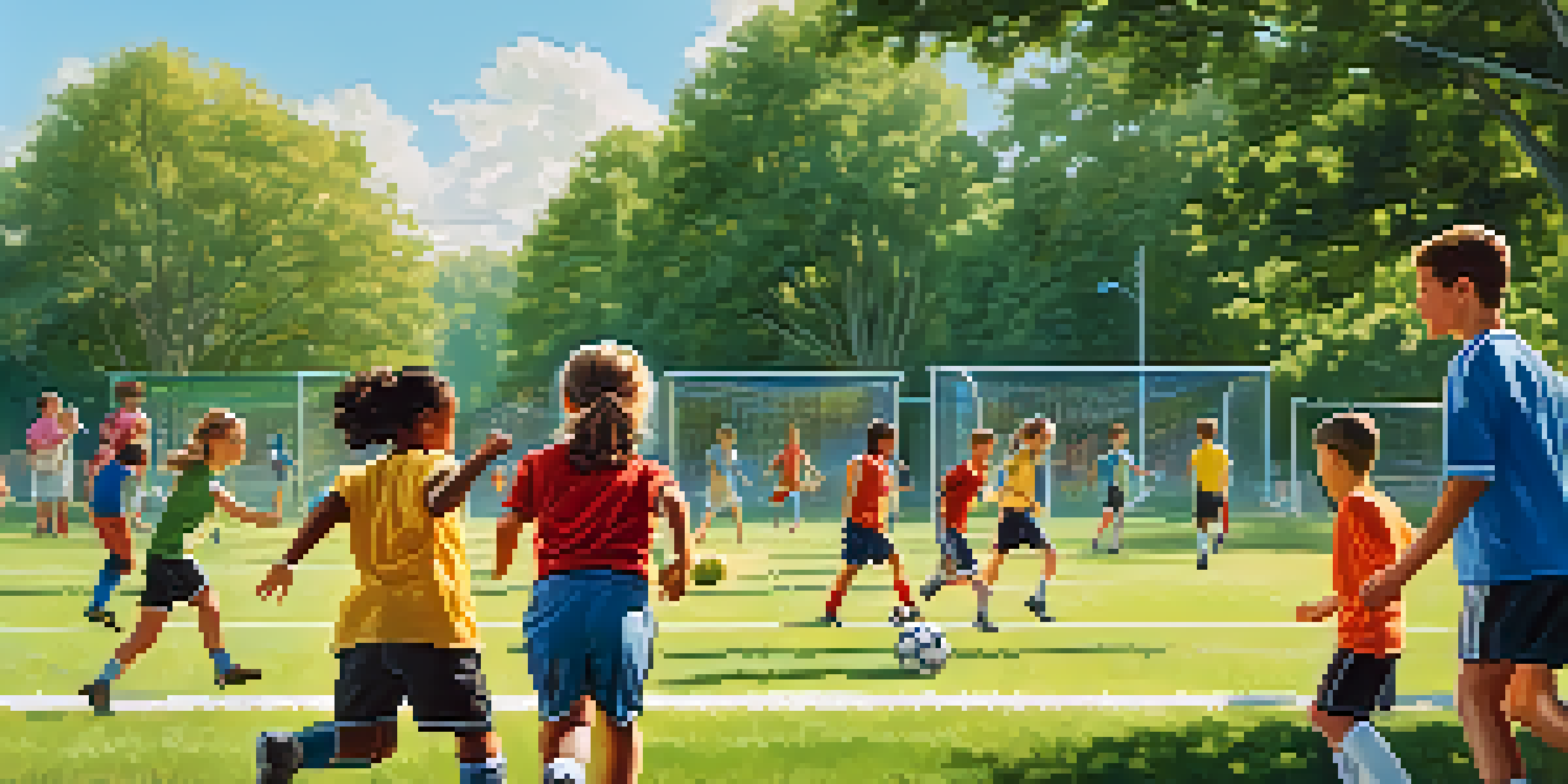The Role of Parents in Youth Sports Programs and Leagues

Understanding the Importance of Parental Involvement
Parental involvement in youth sports is crucial for a child’s experience and development. When parents actively participate, they not only support their child but also help foster a sense of community and teamwork among players. This involvement can range from attending games to volunteering at events, all of which contribute to a positive sporting environment.
Parents can help their children develop a love for sports and physical activity that lasts a lifetime.
Moreover, parents set the tone for their child’s attitude towards competition and teamwork. A supportive parent can boost their child’s confidence and enjoyment, making them more likely to stick with the sport. This foundation can lead to a lifelong love for physical activity and the values that come with it, such as discipline and resilience.
In essence, when parents engage positively, they enhance their child's sports journey, making it not just about winning or losing, but about learning and growing together.
Building a Supportive Sports Community
Parents play a vital role in creating a supportive atmosphere within youth sports leagues. By collaborating with coaches, they can promote open communication and mutual respect, which benefits everyone involved. This strong partnership helps ensure that the focus remains on the players’ development and enjoyment rather than just the outcome of games.

Additionally, when parents organize events, fundraisers, or team outings, they foster camaraderie among families. These activities can build friendships that extend beyond the field, creating a more connected community. When kids see their parents getting involved, they feel valued and included, adding to their overall enjoyment.
Parental Involvement is Key
Active participation from parents enhances their child's sports experience and fosters a sense of community.
Ultimately, a supportive sports community not only uplifts the players but also enriches the experiences of parents and coaches alike, creating a positive cycle of engagement and encouragement.
Navigating Parental Expectations in Youth Sports
Managing expectations is one of the most significant challenges in youth sports. Parents often want their children to excel, but it’s essential to balance ambition with realistic goals. Encouraging children to do their best while understanding that mistakes are part of the learning process can create a healthier sports environment.
The greatest gifts you can give your children are the roots of responsibility and the wings of independence.
When parents set unrealistic benchmarks, it can lead to pressure that diminishes a child’s enjoyment of the game. This stress can cause anxiety, which may even result in burnout. It’s crucial for parents to focus on their child’s personal growth, skill development, and enjoyment rather than solely on achievements or trophies.
By fostering a culture of support and understanding, parents can help children thrive in sports, ensuring they develop a positive relationship with athletics that lasts a lifetime.
Encouraging Sportsmanship and Fair Play
One of the most important lessons in youth sports is sportsmanship. Parents have a significant influence on how their children perceive competition, and modeling respectful behavior is key. By demonstrating good sportsmanship, parents instill values like respect, empathy, and integrity in their children.
When parents cheer for all players, celebrate teamwork, and acknowledge the efforts of opponents, they teach their children the importance of fair play. This positive reinforcement can lead to a generation of athletes who not only strive for personal excellence but also respect their teammates and competitors.
Supportive Sports Communities Matter
When parents collaborate with coaches and organize events, they create a nurturing environment that benefits players and families alike.
Ultimately, instilling sportsmanship helps create a more enjoyable and respectful atmosphere in youth sports, emphasizing the values that extend beyond the playing field.
Supporting Coaches and Their Role
Coaches are instrumental in shaping a child’s sports experience, and parents can play a pivotal role in supporting them. By understanding the coach's philosophy and goals, parents can help create a unified approach to player development. This collaboration ensures that the focus remains on fostering skills and teamwork.
Moreover, showing appreciation for a coach’s efforts can enhance their motivation and morale. A simple thank-you or acknowledgment of their hard work can go a long way in building a positive relationship. This supportive environment encourages coaches to invest more time and energy into their players, ultimately benefiting everyone involved.
When parents and coaches work together, they create a strong foundation for player success, enhancing the overall experience of youth sports.
Promoting Healthy Competition and Resilience
Healthy competition is a vital aspect of youth sports, and parents can nurture this environment. Encouraging children to embrace challenges and learn from losses not only builds resilience but also helps them develop a growth mindset. This mindset allows young athletes to see setbacks as opportunities for improvement rather than failures.
Parents can play a critical role by emphasizing effort and progress over winning. Celebrating small victories, such as improved skills or teamwork, helps children understand that success can come in many forms. This approach fosters a love for the game that transcends the scoreboard.
Balance is Essential for Growth
Helping children manage their time between sports and other life commitments promotes a well-rounded development and a lifelong love for physical activity.
By promoting resilience and healthy competition, parents equip their children with skills that will benefit them both on and off the field.
Balancing Sports with Other Life Priorities
While youth sports can be incredibly rewarding, balancing athletics with other life commitments is crucial. Parents should help their children manage their time effectively, ensuring they can pursue academics, hobbies, and social interactions alongside sports. This balance nurtures well-rounded individuals who can thrive in various aspects of life.
By setting boundaries around practice and game schedules, parents can prevent burnout and maintain the joy of participating in sports. Encouraging breaks when needed and promoting downtime can help children recharge and stay motivated. This holistic approach fosters a lifelong appreciation for physical activity without overwhelming them.

Ultimately, helping children find balance teaches them valuable life skills, such as time management and prioritization, which will serve them well in the future.
The Lasting Impact of Parental Involvement
The influence of parents in youth sports extends far beyond the playing field. The lessons learned through sports and parental involvement can shape a child’s character and confidence for years to come. Many successful athletes credit their parents for instilling values of hard work, dedication, and sportsmanship in their formative years.
Moreover, the relationships built during youth sports often endure long after the final whistle. Families bond over shared experiences, and the connections made can last a lifetime. These memories create a rich tapestry of support and camaraderie that enriches everyone involved.
In short, parental involvement in youth sports not only enhances the immediate experience but also contributes to the long-term development of children, preparing them for future challenges both in sports and in life.